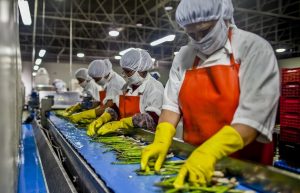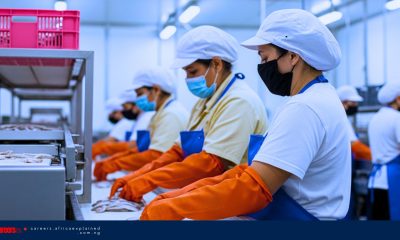Canada Sponsorship
Production/Sanitation Worker Is Urgently Needed in Randstad Canada – Winnipeg, Manitoba

Job Title: Production/Sanitation
Location: Winnipeg, Manitoba
Shift: Morning, Night, Overnight
Wage: $15.75 / hr
Are you an early riser? Do you have access to your own transportation and are seeking immediate entry level work?!
Apply now for this immediate opportunity with a well known Food Chain working in their production facility!
Located near the North Inkster Industrial park area of Winnipeg.
Early morning shifts starting at 5 am!
This is a temporary contract for one week starting ASAP!
Advantages
- $15.75 / hr
- Paid weekly Via direct deposit (plus 4% vacation pay)
- Day shifts starting at 5am
- Working Monday, Tues, Thrs, Fri (4 / 10 schedule)
- Casual, fun, and friendly environment
- Entry level work
Responsibilities
- Wash dough trays using spray washing tools,
- Load and unload dough trays on conveyor belt
- Stack cleaned dough trays and put away
- Prolonged standing, repeated movements
Qualifications
- Previous production experience an asset
- Strong track record of attendance and reliability
- Steel toed shoes required
- Reliable transportation (not bus route accessible)
Summary
Ways to apply :
Email your resume to winnipegindustrial@randstad.ca and include the title of the position in the subject line.
Apply directly on this site
Go to our website at www.randstad.ca, create a profile and apply directly
We thank all applicants for their interest in this position and only those selected for interviews will be contacted.
Randstad Canada is committed to fostering a workforce reflective of all peoples of Canada. As a result, we are committed to developing and implementing strategies to increase the equity, diversity and inclusion within the workplace by examining our internal policies, practices, and systems throughout the entire lifecycle of our workforce, including its recruitment, retention and advancement for all employees.
In addition to our deep commitment to respecting human rights, we are dedicated to positive actions to affect change to ensure everyone has full participation in the workforce free from any barriers, systemic or otherwise, especially equity-seeking groups who are usually underrepresented in Canada’s workforce, including those who identify as women or non-binary / gender non-conforming;
Indigenous or Aboriginal Peoples; persons with disabilities (visible or invisible) and; members of visible minorities, racialized groups and the LGBTQ2+ community.
Randstad Canada is committed to creating and maintaining an inclusive and accessible workplace for all its candidates and employees by supporting their accessibility and accommodation needs throughout the employment lifecycle.
We ask that all job applications please identify any accommodation requirements by sending an email to accessibility@randstad.
ca to ensure their ability to fully participate in the interview process.
What skills and qualities are important for a Production Worker?
Production workers play a vital role in the manufacturing and production process, contributing to the creation of goods and products. To be effective and successful in this role, they should possess a combination of essential skills and qualities. Here are some important ones:
1. Technical Skills: Production workers need to be proficient in using various tools, machinery, and equipment relevant to their specific production tasks.
2. Attention to Detail: Precision and accuracy are critical in manufacturing to ensure that products meet quality standards and specifications.
3. Physical Stamina: The job may involve standing for extended periods, lifting heavy objects, and performing repetitive tasks, so physical stamina is essential.
4. Manual Dexterity: Good hand-eye coordination and fine motor skills are necessary for handling small components and operating machinery.
5. Safety Awareness: Prioritizing safety is crucial to prevent accidents and injuries in a manufacturing environment. Adhering to safety protocols and using personal protective equipment (PPE) is a must.
By possessing these skills and qualities, production workers can contribute to a successful and efficient manufacturing process, helping the company produce high-quality products while meeting production targets.
What education and certification are required to become a Production Worker?
Becoming a production worker typically does not require formal education beyond a high school diploma or its equivalent. Most production worker positions are considered entry-level and provide on-the-job training. However, there are certain skills and certifications that can enhance your employability and advancement opportunities in this field. Here’s what you need to know:
Education:
- High School Diploma or Equivalent: The minimum educational requirement for most production worker positions is a high school diploma or GED.
- Vocational Training (Optional): While not mandatory, vocational training in areas such as manufacturing, industrial technology, or production operations can provide you with valuable skills and knowledge relevant to the field. Community colleges and technical schools may offer relevant vocational programs.
Certifications:
While certifications are not typically required for entry-level production worker roles, certain certifications can enhance your resume and demonstrate your commitment to the industry. Here are some relevant certifications:
- Manufacturing Skill Standards Council (MSSC) Certifications: MSSC offers various certifications related to manufacturing skills, such as Certified Production Technician (CPT) and Certified Logistics Technician (CLT).
- Occupational Safety and Health Administration (OSHA) Certifications: OSHA certifications, such as OSHA 10-Hour General Industry or OSHA 30-Hour General Industry, can demonstrate your knowledge of workplace safety.
- National Institute for Metalworking Skills (NIMS) Certifications: If you’re interested in manufacturing roles involving machining or metalworking, NIMS certifications can be valuable.
- American Society for Quality (ASQ) Certifications: ASQ offers certifications related to quality control and manufacturing processes, such as Certified Quality Improvement Associate (CQIA).
- Lean Six Sigma Certifications: Lean and Six Sigma methodologies are widely used in manufacturing environments. Obtaining certifications like Lean Six Sigma Green Belt can be advantageous.
It’s important to note that while certifications can be beneficial, practical experience gained through on-the-job training and hands-on work in a production environment is highly valuable in this field. Many companies provide training to new production workers to ensure they understand the specific processes and safety protocols of the organization.
As you gain experience and develop your skills, you may consider pursuing additional education or advanced certifications to advance in the manufacturing industry or take on more specialized roles within the production process. Continuously developing your skills and knowledge can open up opportunities for career growth in the manufacturing sector.
Who can apply to this job?
The employer accepts applications from:
- Canadian citizens and permanent or temporary residents of Canada.
- Other candidates with or without a valid Canadian work permit.
How to apply
Online: Apply On Company WebSite
What is the work environment like for Production Worker?
The work environment for production workers can vary significantly depending on the industry, type of production, and the specific company they work for. However, there are some common characteristics of the work environment for production workers:
1. Manufacturing Plant or Factory Setting: Production workers typically work in manufacturing plants, factories, or production facilities where goods are produced and assembled.
2. Physical Demands: The job can be physically demanding, involving standing for extended periods, lifting, bending, and repetitive motions. Production workers may handle heavy materials or operate machinery.
3. Noise and Machinery: Manufacturing environments can be noisy due to the operation of machinery and equipment used in the production process.
4. Shift Work: Many manufacturing plants operate on multiple shifts, including daytime, evening, and overnight shifts, to maintain continuous production.
5. Fast-Paced Environment: Production workers often work in a fast-paced setting, meeting production targets and maintaining efficient workflow.
Overall, the work environment for production workers is focused on efficiently producing goods or assembling products according to established standards. Effective teamwork, attention to detail, adherence to safety protocols, and a commitment to quality are essential for success in this role.











